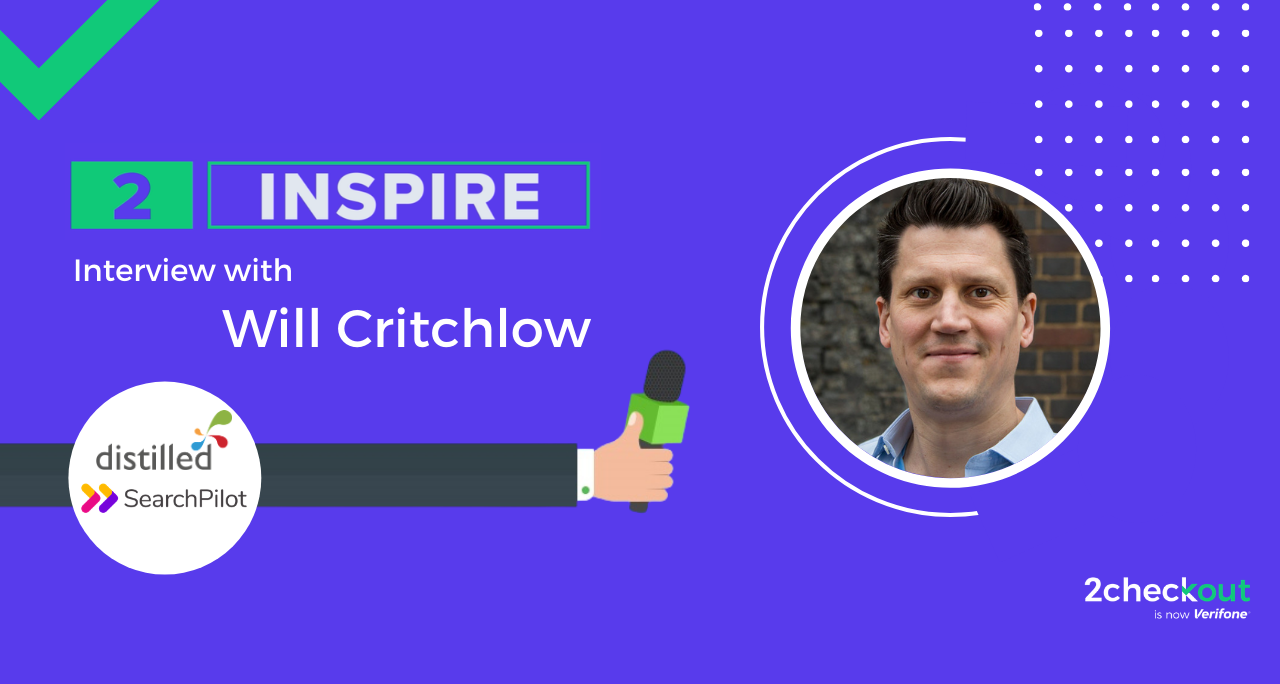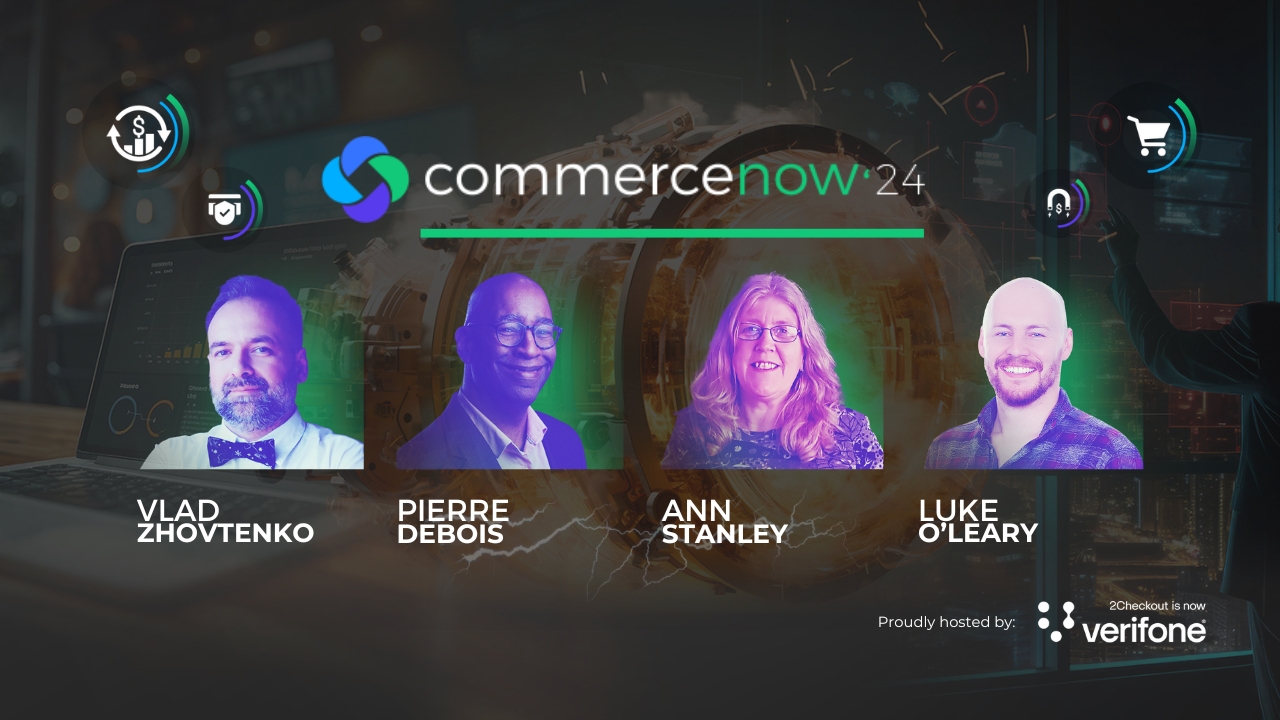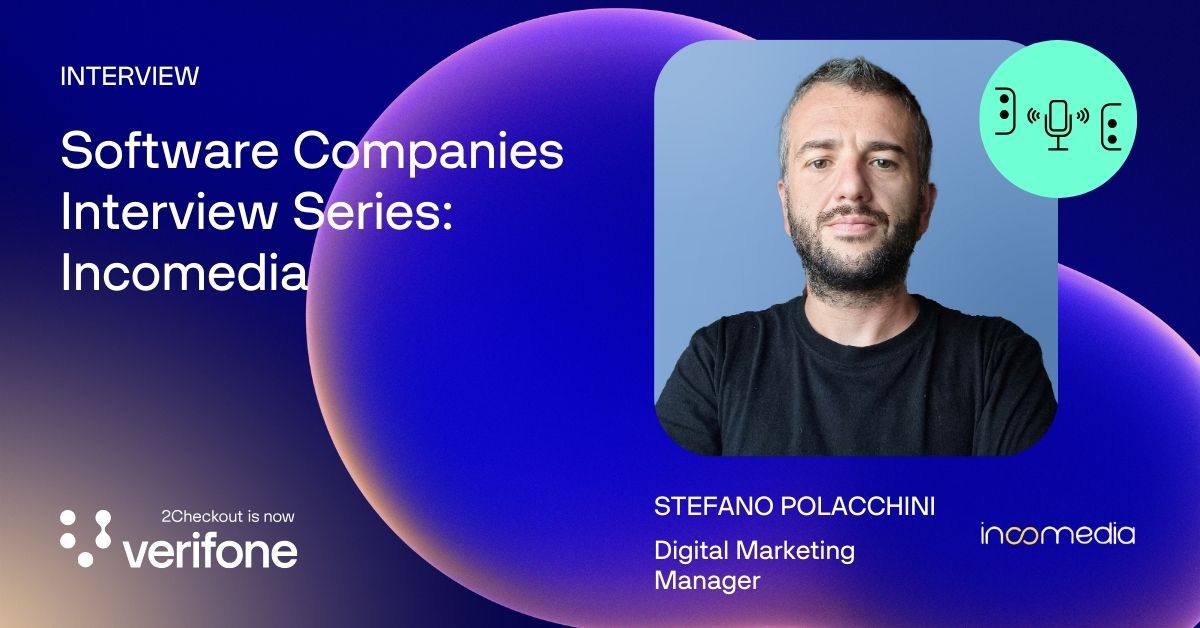Welcome to our reimagined 2Inspire Interview Series, where we feature entrepreneurs, managers, experts, and creatives who share their success stories, resources and tools, and advice for succeeding in the eCommerce world. Keep on reading to get a quick dose of inspiration for moving your business forward.
For our first interview, we had the pleasure to chat with Will Critchlow, founder of Distilled (online marketing agency) and SearchPilot (SEO split-testing platform), as well as Associate at Moz. He is a familiar name for all SEO professionals out there – not only by being a regular speaker at industry events but also due to SearchLove, the renowned SEO conference that his agency is hosting.
We talked about his journey in online marketing and how he started with “email marketing before email.” He also shared more insights about the concept pioneered by Distilled, SEO split-testing – what it is and how can eCommerce businesses leverage it. We also asked him about the future of SEO and what changes we should expect from Google. To learn all these plus other valuable SEO tips and tricks for eCommerce businesses, make sure to watch the full interview!
Check out the full interview below:
Transcript
Q1: What inspired you to become an entrepreneur? (00:14)
The psychologists would probably say the reason I became an entrepreneur is that it’s in my upbringing. My earliest memories are of my father having a job and commuting to an office and then, him starting his own business and working from home. So, I remember, before I was even 10, I was helping with things like stuffing envelopes (you know, the email marketing before email) and that kind of things. And then, I think, the other side of it was getting interested in technology and wanting to build things.
Q2: What are some things you’ve learned that you can share from the rebranding process you’ve recently gone through with DistilledODN? (00:55)
We spun out the Optimization Delivery Network from Distilled into an independent company called SearchPilot. Our rebranding process was in the midst of quite a lot of chaos because we also were in the midst of a transaction and then we ran into a global pandemic.
I think my biggest tip, especially for the small businesses doing this, is to have fun with it. Some of the stuff that we have got the most out of has been just enjoying building the new brand, thinking about what we wanted to have different and drilling down into things like the visual brand, values and the culture of the company that we’re creating and trying to think about how that is going to pervade everything we do.
Q3: What are some of the challenges you experienced when organizing your industry-leading event, SearchLove? (02:01)
The biggest challenge that we’ve faced head-on is trying to diversify our speaker lineup. If you just put out a call for speakers you inevitably just get people like me – overconfident, middle-aged white guys.
We wanted to walk away from that, so we had to get quite proactive with it, including not only the outreach side but also developing speakers. We put a lot of effort into developing new speakers, coaching them, giving them the tools, and training them, and helping them get onto the big stage.
Q4: Have you considered taking SearchLove online? (02:57)
I’m a big fan of trying to solve the development, learning, knowledge sharing, idea generation challenge in lots of different ways and I think there’s a place for pure online things but I also don’t think that’s going to, in the long run, replace in-person.
You know, we just have to buy our time, but when the time is right, SearchLove will be back as an in-person event.
Q5: Can you share more about the concept of SEO split-testing? (03:27)
SEO split-testing is something that we’ve tried to pioneer and bring to the wider market.
It’s similar to the idea that many people are probably familiar with in terms of testing for conversion rate optimization (CRO) or user experience (UX) reasons, but there’s a couple of key differences.
Instead of splitting the audience, which is the way that a conversion rate test works, we split the website. So we take some pages and keep them unchanged and make the change to other pages. Then we apply some advanced mathematical statistical techniques to figure out whether those changes are statistically significant and whether we’re statistically confident that there has been an uplift.
Q6: What’s an SEO myth that you constantly come across in your work? (04:20)
Probably the thing that we come across most is the idea that there are fixed truths that apply to every website or every situation.
For the most part, it’s a myth that many of those things exist. What we find when we test is very situational, so it depends on the industry, on the website, and the individual pages.
Q7: Considering the increased role of machine learning in SEO, do you think a more technical background will become required for SEO professionals? (04:42)
I think there’s space in SEO for many different backgrounds. Some of the most talented marketers and SEOs that I’ve worked with have ranged from advanced degrees in science, technology, and mathematics to, you know, no university at all.
I think there is a space in a team to have people with that kind of background because some SEO challenges are deeply technical and you need at least the experience, but you don’t necessarily need a university qualification in those areas. I feel safe saying it as somebody who has one.
Q8: How does a business establish E-A-T in the online space? (05:32)
I would approach the idea of establishing Expertise, Authority, and Trustworthiness as kind of at face value, like actually develop them rather than trying to prove to Google that you have those things.
I’ve been a big fan of really doubling down on the Expertise side. I think it’s been great for people’s morale and enjoyment of working at a company to know that they can really develop mastery in their chosen subject.
Q9: What are some key SEO areas that eCommerce businesses should focus on? (06:10)
If you have category pages, then experiment with putting structured markup lists of products on your category pages.
It’s quite common to use structured data on the product pages themselves but you can actually markup category pages with a list of structured data and say that this page contains this list of products. That’s not only going to help you rank better, but it can help you get rich richer snippets and better click-through rates in the search results and therefore get more organic search traffic.
Q10: How can businesses ensure that organic traffic is qualified and that it will convert? (06:51)
On the one hand, I don’t worry about it too much in the sense that incremental clicks are free. You get the traffic you want as well as ranking better for things that you don’t care about and that’s okay. It’s okay to get irrelevant organic traffic in a way that it’s probably not okay to pay for irrelevant paid search traffic.
Instead, we focus on the areas that are good for us, and what we’re doing in those areas is a concept of full-funnel testing which is the idea of simultaneously testing a change to see whether it is good for conversion rate and, separately, to see whether it’s good for organic traffic and SEO.
Q11: What do you think will be the focus in 2021 for SEO? (07:44)
Having been around the industry for 15 years plus now, I’m always surprised by how little things change or how slowly. Some of the tactics change and yes, new features will be released, but the fundamentals (crawling, indexing, authoritativeness) have been unchanged for a decade plus.
So, the fundamentals aren’t going to be different in 2021. What I think is changing is Google increasingly moving to its machine learning-driven approach. This means that the best practices go away and there is no unified right answer, hence why we’re all in testing.
Q12: What do you consider to be your best growth channel? (08:38)
Our best growth channel is probably email. Though I always feel weird calling email a channel because, of course, it is as a last touch. How do people get on your list? Well not from email marketing, obviously.
Going a level beyond that, I mean, fundamentally a lot of it is about search. We do some work on social but we’re trying to create content on our website that will be evergreen and that will continue bringing us organic traffic for years to come.
Q13: What is an online marketing tool you most rely on, and can recommend? (09:14)
The third-party tool I find hardest to operate without is any kind of crawling technology.
If I was going to give two specific examples it would be Screaming Frog for getting started (cheap and effective) and, at scale, we’ve bought DeepCrawl.
Q14: Who are some inspirational people that you look up to and why? (09:45)
People I’ve tried to look up to are people with the grit and determination to make their own path and that’s what I’ve tried to take into my own life. Okay, well I can take advantage of the areas I’ve been lucky and then how can I make my own luck in the areas I need to.
Q15: What is the best book you’ve read? (10:08)
The single book I recommend most often is Patrick Lencioni’s “Five Dysfunctions of a Team” which changed my business life.
It’s written for CEOs but it’s valuable to every level of contributor in every team. The core concepts and a lot of the language in there has made its way into our leadership team meetings over the years.
Q16: What is the best advice you’ve ever received? (10:40)
I think the best advice I’ve received is not to compare your inside to other people’s outside. In other words, not to compare how you feel with how it looks like other people feel because you can never really tell.
You’ll think you’re a mess of insecurity and uncertainty and that other people are confident and have it together but they’re thinking the exact same thing, the other way around.
Stay in the know
We hope you’ve found some valuable insights. Until our next interview, gain some more inspiration and ideas from our previous 2Inspire speakers!
- 2Inspire Interview with Sujan Patel, Co-Founder of Mailshake
- 2Inspire Interview with Kevan Lee, VP Marketing at Buffer
- 2Inspire Interview with Brian Massey, founder of Conversion Sciences
- 2Inspire Interview with Marvin Liao, Partner at 500 Startups





